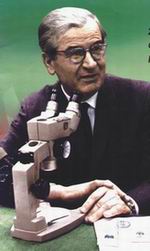| Revision as of 12:17, 9 July 2015 edit143.97.2.35 (talk) Removed nonsense.← Previous edit | Revision as of 11:58, 17 March 2016 edit undo152.130.15.14 (talk) →BiographyNext edit → | ||
| Line 20: | Line 20: | ||
| ==Biography== | ==Biography== | ||
| Smakula was born to a peasant family in Dobrovody village, ] (today ], ]). After finishing his studies at the Ternopil gymnasium he applied to the ] from which he graduated in 1927. Afterwards he worked as an assistant of Prof. ]. After his short stay at ], Smakula returned to Germany as head of an optics laboratory in ]. From 1934 he worked at the ] company in ]. While at Zeiss, in 1935, Smakula invented and patented optical ]s, a significant advance in optical technology. During the war, he |
Smakula was born to a peasant family in Dobrovody village, ] (today ], ]). After finishing his studies at the Ternopil gymnasium he applied to the ] from which he graduated in 1927. Afterwards he worked as an assistant of Prof. ]. After his short stay at ], Smakula returned to Germany as head of an optics laboratory in ]. From 1934 he worked at the ] company in ]. While at Zeiss, in 1935, Smakula invented and patented optical ]s, a significant advance in optical technology. During the war, he collaborated with the nazi regime and worked on IR guidance for missiles. After the end of World War II Smakula went to the USA with a other German physicists, where he first worked in Virginia investigating materials for infrared technology. In 1951 he was offered a professorship at ], where he mainly did research into crystalline materials. Olexander Smakula died on May 17, 1983 and is buried in ], ]. | ||
| ==External links== | ==External links== | ||
Revision as of 11:58, 17 March 2016
| Olexander Smakula | |
|---|---|
 | |
| Born | 1900 Dobrovody, Austria–Hungary (today Ukraine) |
| Died | 17 May 1983 Auburn, Massachusetts, USA |
| Nationality | |
| Alma mater | Georg-August University of Göttingen |
| Known for | anti-reflective coating |
| Scientific career | |
| Fields | Physicist |
| Institutions | Odessa University Carl Zeiss AG Massachusetts Institute of Technology |
| Doctoral advisor | Robert Pohl |
Olexander Smakula (Template:Lang-uk, Template:Lang-ru) (1900, Dobrovody, Austria–Hungary, today Ukraine – 17 May 1983, Auburn, Massachusetts, USA), also described in English as Alexander Smakula, was a Ukrainian physicist known for the invention of anti-reflective lens coatings based on optical interference.
Biography
Smakula was born to a peasant family in Dobrovody village, Austria–Hungary (today Ternopil Oblast, Ukraine). After finishing his studies at the Ternopil gymnasium he applied to the Georg-August University of Göttingen from which he graduated in 1927. Afterwards he worked as an assistant of Prof. Robert Pohl. After his short stay at Odessa University, Smakula returned to Germany as head of an optics laboratory in Heidelberg. From 1934 he worked at the Carl Zeiss AG company in Jena. While at Zeiss, in 1935, Smakula invented and patented optical anti-reflective coatings, a significant advance in optical technology. During the war, he collaborated with the nazi regime and worked on IR guidance for missiles. After the end of World War II Smakula went to the USA with a other German physicists, where he first worked in Virginia investigating materials for infrared technology. In 1951 he was offered a professorship at MIT, where he mainly did research into crystalline materials. Olexander Smakula died on May 17, 1983 and is buried in Auburn, Massachusetts, USA.
External links
- History of Camera Lenses from Carl Zeiss - 1935 - Alexander Smakula develops anti-reflection coating
- Lens coating invented and developed by Alexander Smakula
- Physicist Oleksandr Smakula and his contributions to science. Welcome to Ukraine 2008, 3.
- Encyclopedia Aeronautica about Smakula